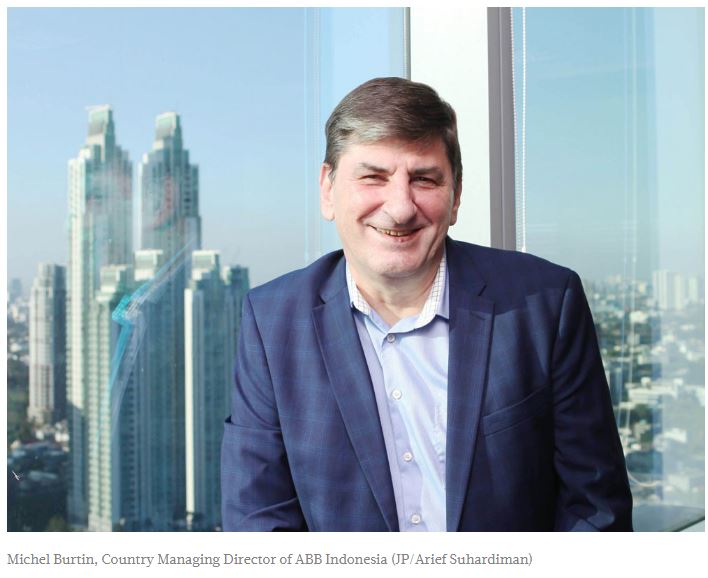ABB supports The Making of Indonesia 4.0
The world is undergoing transformational technological change. Intelligent machines, self-driving cars, mobile supercomputing, genome editing, neuro-technological brain enhancements. These dramatic changes are happening now at exponential speed.
This revolutionary change called the fourth industrial revolution (Industry 4.0) has had an impact on the way people live, work and communicate. It is reshaping government, education, health care and commerce.
On a global scale, Industry 4.0 impacts the global industrial and energy landscape, with digital technologies driving rapid transformation across industries. Energy systems are also changing, mainly driven by renewables in the energy mix. Digital data collected from devices that enable customers to increase efficiency and productivity help improve quality and safety, and reduce their environmental footprint.
As Industry 4.0 gathers momentum, ABB is writing the future of digitalization by developing solutions that help customers capitalize on the efficiency and performance improvements that digitalization delivers today.
In Indonesia, ABB has been strongly established under PT ABB Sakti Industri. “We’re well positioned in the country as we’ve been here since 1988,” said Country Managing Director of ABB Indonesia Michel Burtin recently. “With four manufacturing facilities, 11 sales offices and four workshops across Indonesia, the company has demonstrated its leading technology in power and automation to support the growth of the country,” he continued.
With such a large installed base, ABB has helped customers across industries in several key projects with technological solutions and systems in Indonesia, including: Indonesia’s second-largest airport in Kertajati; enhancing PLN power supply and grid reliability; delivering power quality for the 2018 Asian Games; electrical services for the Soekarno-Hatta Rail Link (ARL) and Palembang Light Rail Transit (LRT) trains; advanced power and automation technologies for the world’s largest pulp mill in South Sumatra; and increasing safety, productivity, and efficiency for Indonesia’s food and beverage companies like Indolakto and Bogasari.
As part of the company’s commitment to technological innovation while growing the core competencies needed in power and automation, ABB Indonesia has established an R&D center in Bali that develops enterprise software designed and built by 70 local engineers. The setting-up of the center was well aligned with the government plan to build local competencies in Indonesia.
“We have been developing and utilizing more local content. This is evidenced by the presence of our manufacturing, engineering and service facilities, and our software R&D center in Bali to meet government regulations on the requirement for more local content,” said Michel.
He said more skills are required to enable ABB to sustain its strong leadership in Indonesia. “Therefore, we want to recruit the best talent among Indonesian youngsters and we’re committing resources into training them to get better capabilities in technology,” he said.
As part of the company’s commitment to nurturing future Indonesian talent, ABB Indonesia has established a partnership with the Bandung Institute of Technology (ITB) through the ABB Jürgen Dormann Foundation for Engineering Education, providing scholarships to ITB students to encourage the development of competencies in power technology since 2013.
Raising workers’ skills is a key focus of President Joko “Jokowi” Widodo in his second term. Jokowi has included human resources development as an integral part of his next government’s policy to accelerate preparations toward realizing Industry 4.0 in Indonesia.
“We see Indonesia anticipating the development of Industry 4.0 as we see it being anticipated by the government and industry,” Michel said.
The Making of Indonesia 4.0, which is aimed at preparing Indonesia for Industry 4.0. has set five priority sectors, namely food and beverages, textiles and textile products, chemicals, electronics, and automotive, which account for 60 percent of Indonesia’s GDP and exports, as the priority sectors for development to anticipate the era of Industry 4.0.
With much stronger focus in digitalization now, ABB Indonesia has been actively engaging with governments and customers across various sectors including utilities, industry and infrastructure to drive progress in digitalization to help faster adoption of this industrial revolution.
“In this digitalized world, the population is increasingly digitized, affluent, aging and seeking sustainable solutions. So, customers nowadays increasingly demand not only good quality products, but also how they can have a higher degree of efficiency and productivity, better profitability. People want sustainable living conditions,” Michel explained.
“Sustainable growth is driven by the adoption of digital technologies and advanced manufacturing applications. The Making of Indonesia 4.0 will be a strong growth driver to strengthen Indonesia’s position in the region and the world. As a technology leader with strong presence in Indonesia for more than 30 years, ABB Indonesia is committed to be part of this transformation.”
Source: https://www.thejakartapost.com/adv/2019/08/01/abb-supports-the-making-of-indonesia-4-0.html


 English
English




